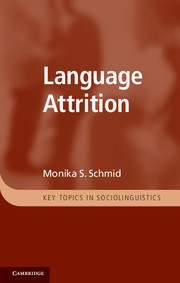Book contents
- Frontmatter
- Contents
- List of figures
- List of tables
- Preface
- Abbreviations
- 1 Introduction
- Part I Linguistic aspects of language attrition
- Part II Extralinguistic aspects of language attrition
- 6 Personal background factors
- 7 The role of L1 input and output
- 8 Attitudes and identities
- Part III Conducting research on language attrition – preliminary considerations
- Part IV Experimental designs for attrition research – the language attrition test battery
- Part V Coding and analysing the data
- 18 Conclusion
- Glossary
- Notes
- References
- Index
6 - Personal background factors
Published online by Cambridge University Press: 05 June 2012
- Frontmatter
- Contents
- List of figures
- List of tables
- Preface
- Abbreviations
- 1 Introduction
- Part I Linguistic aspects of language attrition
- Part II Extralinguistic aspects of language attrition
- 6 Personal background factors
- 7 The role of L1 input and output
- 8 Attitudes and identities
- Part III Conducting research on language attrition – preliminary considerations
- Part IV Experimental designs for attrition research – the language attrition test battery
- Part V Coding and analysing the data
- 18 Conclusion
- Glossary
- Notes
- References
- Index
Summary
To what extent do factors such as age at migration, length of time elapsed since emigration, or age at testing determine how far a speaker will attrite? This chapter will investigate the impact of such personal background variables for the attritional process.
THE AGE FACTOR
When the journal Science was 125 years old in 2005, the editors compiled a ‘survey of scientific ignorance’ entitled ‘What don't we know?’ for the anniversary edition: a research agenda consisting of 125 questions on matters such as extraterrestrial life, the cause of ice ages, how much of personality is genetic, how to cure cancer, and so on. Also on that list is the question that splits linguistics straight down the middle: why are children better at language learning than adults?
NOTE
The controversy about this issue goes back at least fifty years, and centres on a simple question: Is there a stage in human development (situated around the onset of puberty and often called the ‘Critical Period’) when a language-specific maturational change takes places in the brain, which makes language learning through the original, dedicated processes impossible and forces older learners to develop compensatory strategies? Or are older learners hampered by an accumulation of factors which are more general? These factors may include the fact that the higher level of cognitive development and analytical skills that older learners draw upon is more suitable for the acquisition of other types of knowledge, but can hamper language acquisition. Also, of course, our ability to learn and memorize things generally deteriorates as we get older.
- Type
- Chapter
- Information
- Language Attrition , pp. 71 - 80Publisher: Cambridge University PressPrint publication year: 2011



